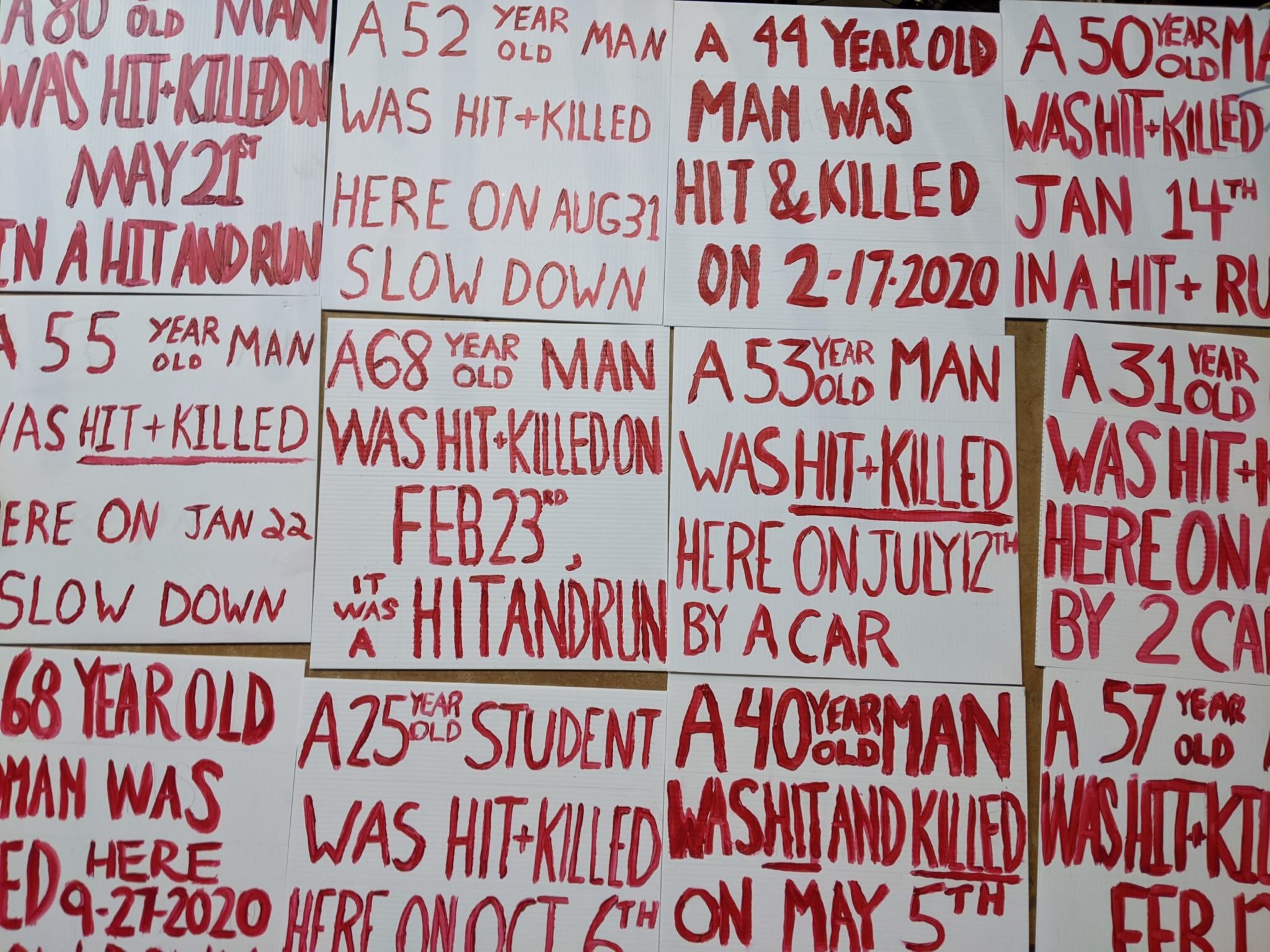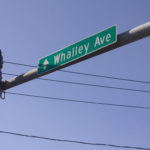
Courtesy of Pavla Rosenstein
Four white bicycles have been placed in the Elm City, each one commemorating a victim of local traffic accidents within the past year. The bicycles are accompanied by a sign with the age and gender of the deceased.
The installations are called “Ghost Bikes” –– a method used around the world to memorialize sites where cyclists have been killed. This year, they are part of an effort by a coalition of New Haven residents to advocate for safe, accessible and just transportation. “Safe Streets,” which formed late last year, hosted a memorial yesterday for the 13 local pedestrians and cyclists that have been killed in traffic collisions in this year. On Sunday, more than 30 people came out to the New Haven Green to pay their respects in solidarity with annual World Remembrance Day for Road Traffic Victims.
“We want to take this moment to remember members of our community whose lives have been so tragically and needlessly lost because of inadequate traffic systems,” said Safe Streets organizer Kai Addae. “The time has come to stop normalizing and ignoring New Haven’s traffic violence and work together to create safer streets for cyclists and pedestrians in our city.”
At the event, Addae read out the names of each traffic victim aloud and then asked attendees to observe a moment of silence. After sharing a story of her own personal loss, she opened the floor to other residents, many of them cyclists themselves. Some told stories of their own collisions or near-collisions with vehicles in the Elm City. Others, like Max Chaoulideer GRD ’21, shared stories about the loss of friends and family members.
“We were biking to get ice cream, and there was a drunken driver who crossed over the lanes of traffic and hit my friend behind me,” said Chaoulideer, who is a member of Safe Streets. “He died that day. We need to think about people like my friend and others who have died or been severely injured, and work together so that going to get ice cream or going to work or any of the things that should be normal are not scary, dangerous and potentially fatal.”
This is the first time Safe Streets has held any sort of memorial event. Addae told the News that the coalition hopes it will prompt city and state officials to see the need for progress towards Vision Zero. Vision Zero is a multinational project which aims to eliminate all traffic fatalities and severe injuries while ensuring safe mobility.
Safe Streets is calling for major improvements on dangerous roads in New Haven and a citywide “neighborhood greenway” network, which would designate protected paths for cyclists. Currently, the city’s “Vision 2025” document includes a plan to implement “a continuous and inter-linked bicycle trail network within the city.”
“We want to create a high-impact network in the city of streets and intersections that the data shows are the most dangerous,” Chaoulideer said. “We hope that with enough citizens and residents’ backing, we can get the city to push for more meaningful change in the next few months.”
Addae said the ghost bike initiative started in New Haven when 54-year-old cyclist David Toles was hit and killed by a drunken driver on Dixwell Avenue last month. Safe Streets built Toles a ghost bike to honor him. Weeks later, several Yale students reached out and asked if they could build a bike for Keon Ho Lim, a Yale Law School student who died while biking near the Yale New Haven Hospital last month. Additional bikes have been installed by Safe Streets at the intersection of Grand Avenue and Ferry Street as well as in Wallingford, CT. Addae said that these white bikes will become a network of powerful visual reminders of the need for change.
Bogyum Lim, sister of the late law school student, told the News that while she was not consulted about the memorial, she was “glad to hear” that a gathering was planned partially in his honor.
Addae said Safe Streets hopes to get in touch with family members of recent traffic crash victims to offer support and encourage them to tell their stories.
“In the midst of these tragedies, we thought it was important to honor all of the lives lost on our streets and bring attention to the very concerning trend happening in New Haven” said Addae in an email to the News. “We have had more traffic deaths already than all of last year, and too often our city and state are focused on reducing congestion and traffic instead of keeping us safe.”
According to the New Haven Register, there were 11 fatal traffic crashes in New Haven last year. A press release from Safe Streets said that since 2017, there have been 437 motor vehicle crashes that resulted in either serious injury or death.
Addae said that legislative changes such as automated traffic enforcement need to happen at both a city and state level to ensure safer streets. Automated traffic enforcement, which includes speed cameras and red light cameras is prohibited by Connecticut law. That is partially due to concerns voiced by the NAACP and ACLU about racial injustice tied to automated enforcement.
But Safe Streets members say that speed and red light cameras are necessary to keep people safe.
“We believe that from a racial justice standpoint, and from a city budget standpoint, having armed police officers pulling people over is a super inefficient and dangerous way to enforce traffic,” said Chaoulideer. “We believe automated enforcement would be a win for everyone.”
Safe Streets also called for the city to make crash data and infrastructure project updates accessible to the public. The directive is included in the city’s ‘Complete Streets’ Design Manual –– a document created by a nine member committee appointed by the Board of Alders in 2008. Its goal is to promote a safe transportation network and the design of streets that foster a livable community.
Douglas Hausladen, director of the New Haven Department of Transportation, Traffic and Parking, did not respond to a request for comment.
At the event, Addae urged those who know somebody who was hit and killed by a vehicle in New Haven to reach out so Safe Streets can organize the construction of a memorial.
World Remembrance Day for Road Traffic Victims is a global event established by the United Nations in 1995.
Natalie Kainz | natalie.kainz@yale.edu
Isaac Yu | isaac.yu@yale.edu








